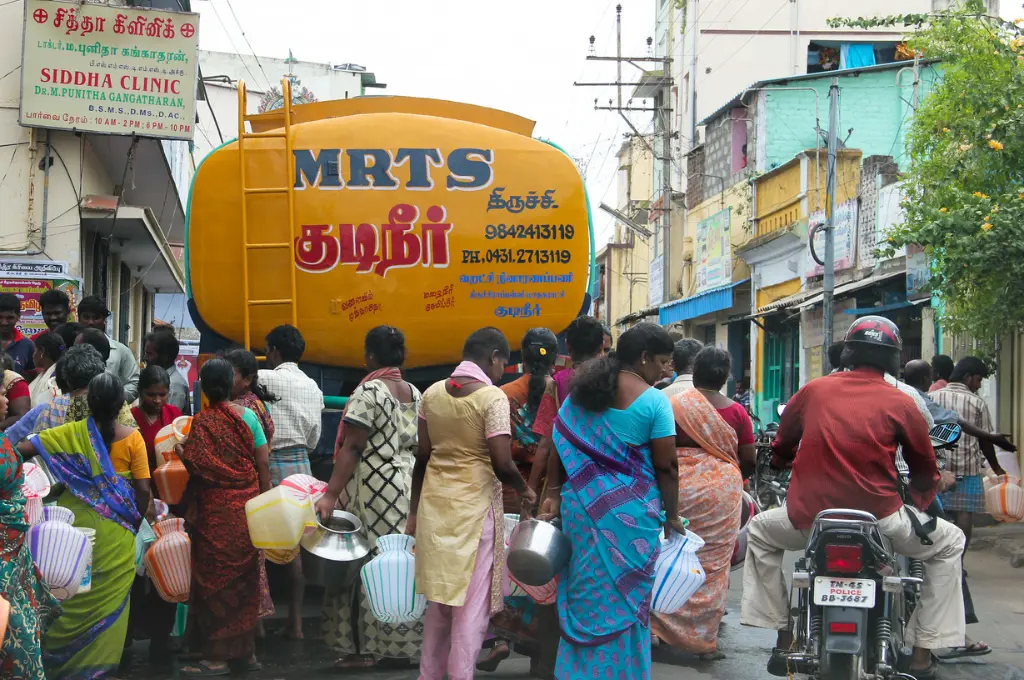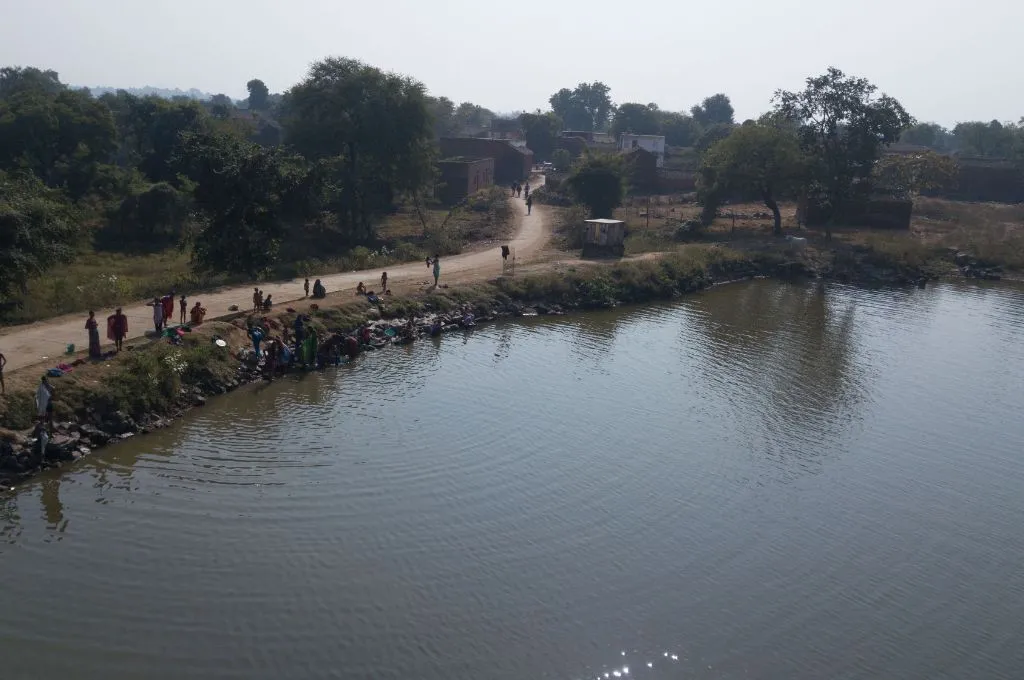My name is Pravin. I live in Mumbai but am originally from a village in Maharashtra’s Buldhana district. I am a co-convener of Pani Haq Samiti (PHS), an organisation dedicated to fighting for water rights. Since 2010, we’ve been working tirelessly to ensure that people have access to clean water—a fundamental human right.
The struggle for water as a universal right in Mumbai can be traced back to a discriminatory directive introduced in March 1996, when Maharashtra’s Urban Development Department (UDD) issued a circular across all municipal corporations in the state. The circular stated that “water supply to any illegal constructions shall not be approved”, and effectively denied municipal water supply to bastis (settlements) that cropped up after the government-mandated cut-off date of January 1, 1995. Consequently, the Municipal Corporation of Greater Mumbai (MCGM) enforced this rule, preventing the residents of these “unauthorised settlements” from obtaining government water connections.
The situation became more critical in 2007 when the MCGM attempted to privatise water supply based on the recommendation of a consultant group working with the World Bank. As a collective, PHS views water as part of the commons, a resource that should be managed by the government, not owned by private entities. This view was shared by various nonprofits, sangathans (collectives), individual researchers, intellectuals, and workers living in bastis. People came together to oppose this move, as we believed that water should not be commodified and denied to those who need it the most.
By 2012, PHS had filed a writ petition in the Bombay High Court, arguing that water is a basic right and should be provided to everyone without delay. In 2014, the court ruled in our favour, affirming that water is indeed a right for all people. Despite this, the BMC showed no signs of implementing the court’s decision. Our karyakartas, or members, protested at the BMC’s headquarters, demanding immediate action. This led to the Pani Pilao Abhiyaan, where thousands of people brought water from their neighbourhoods to the BMC and symbolically offered it to the officials to highlight their plight.
Our persistent efforts bore fruit on January 10, 2017, when the BMC sanctioned a policy titled Water for All; this was further amended in May 2022. However, the policy included riders that have led to continued exclusion on the basis of certain criteria. Many people—especially those living in informal settlements on land under the central government’s jurisdiction or near the seashore—were still excluded from accessing water. But this partial victory spurred us to continue our work, which includes helping people with their applications, following up with the BMC, and ensuring that more communities receive water connections.

6.00 AM: I wake up early every day to prepare myself for the day ahead. Soon after, I leave for the PHS office. My partner and I live relatively close to the office in Jogeshwari, so it doesn’t take me long to get there. The government offices that PHS interacts with on a regular basis open at 8.30 am and close at 4 pm, so we start our day early in order to make the most of this time window.
Our mornings are usually spent visiting these offices to check on the status of pending water connection applications, ensuring that documents are signed, and pushing the officials to process the often-ignored requests of people who have been denied water for years. This part of the day calls for a persistent attitude and relentless following up.
Though there have been significant milestones, challenges still remain. Water access continues to be a problem, especially for those living in areas such as Ambedkar Nagar in Malad, and for other marginalised communities residing on central government land or in forested areas.
In fact, the names of the areas that experience water accessibility issues speak volumes. These settlements are all named after Dalit or Bahujan leaders—Bhim Nagar, Ambedkar Nagar, Ashok Samrat Nagar, Shivaji Nagar, Siddharth Nagar, and Gautam Nagar. The residents of these areas—generally Dalits, OBCs, or Muslims—often live next to major arterial roads, or in certain deprived bastis. These groups are structurally kept away from resources, much like the Dalits in villages who are segregated from everyone else.
Water is weaponised against them. Political leaders and bureaucrats say things such as, “If you want water, then you must vote for us in the election; only then will we give it to you,” or, “We will give you water, but you must pay such-and-such amount every month.”
11.00 AM: My daily work involves repeated follow-ups with local authorities and supporting those who lack water connections in their homes. We also monitor the situation in various regions across Maharashtra, understanding the local laws and the reasons behind the lack of water access.
My life has always been intertwined with the struggle for water. Before joining PHS, I lived in a basti in Mankhurd where we had to buy water from Shivaji Nagar, which is approximately one kilometre away. As a child, I often helped my parents collect water. Over time, we managed to get a water connection, but the struggle left a lasting impression on me.
Family has always been an important part of my life. I lost my mother a few years ago. She had mixed reactions to my line of work. Although she appreciated it in principle, she used to worry that it would get me into trouble. My father is a plumber and my brother works in the construction industry. My younger sister left home to escape the traditional, marriage-focused environment. She continued to pursue her education independently and is now working on her PhD in microbiology.

My schooling was spread across various places, starting in Mumbai and then at my village for a few years. I later returned to Mumbai and completed grade 10. After spending two years in an army hostel in Chandrapur, I attempted to pursue higher education in science at Western College of Commerce and Business Management in Sanpada, Navi Mumbai. However, due to personal and financial challenges, I couldn’t continue my studies and ended up working at a call centre.
Various organisations, including YUVA, worked in our area on different issues such as education and health. I initially joined YUVA and later worked as a surveyor for the Slum Rehabilitation Authority (SRA). It was through a friend that I learned about PHS and decided to apply.
My work with the SRA was a turning point in my life. It exposed me to the ground realities of slum redevelopment and government policies. I learned to interact with people, understand their issues, and navigate the complexities of government procedures. This experience gave me the confidence to engage with communities and advocate for their rights.
Eventually, I reconnected with YUVA by attending City Caravan, a workshop organised by them. At this workshop, I learned about different topics including human rights, gender equality, and the importance of collective action. This newfound knowledge and my friend’s encouragement led me to join Pani Haq Samiti.

2.00 PM: Lunch breaks at PHS are flexible. When we are in the field, we don’t always have time for a proper meal. Sometimes, we just grab a vada pav on the road! If we are in office, then we have lunch together.
Mobilising communities and building awareness is a crucial part of our work. We use various methods—street plays, songs, playing the dafli (tambourine), and disseminating pamphlets—to engage with people and help them learn about their rights. In fact, one of our street plays—Paani Zindagaani—became quite popular, and other organisations would also invite us to perform it for the communities they work with.
However, convincing people that they have the right to water and can fight for it is often difficult. Many have experienced disappointments and exploitation in the past, making them sceptical of any efforts related to accessing rights. Officials and middlemen often take their documents and money. The community places their trust in actors who often end up cheating them. But our method is different in that we emphasise the collective nature of the struggle and the importance of community participation. PHS is not Rajinikanth—community members need to take ownership of their issues and lead the way.
We are not assuming the role of agents in settlements. We want nothing to do with their money. Our goal is to assist them throughout the process of applying for water tap connections—from filling out the forms to the arrival of water in their taps. We believe in the slogan ‘Jinka sawaal, unka netritiva (Those whose issue it is must lead)’.
5.00 PM: My work with PHS is not a typical nine-to-five job. My daily routine comprises early starts and long hours, working in both the office and the field. Recently, I have taken on the role of a campaign coordinator, where I supervise karyakartas working in different wards. I oversee document checks, follow up on applications, understand their daily plans and agendas, offer relevant suggestions, and hold meetings with them when necessary.
The path to accessing the right to water can often present disheartening roadblocks, but I honestly believe there are also moments of joy along the way. For example, beside the railway track that connects Matunga and Dadar, there’s a settlement called Hanuman Basti. This basti has not received regular water access since India’s independence; residents had to cross the tracks to get water from a malfunctioning tap. When we helped them file an application and officials came to check the status of their water supply, people were overjoyed. Puzzled by their response, we asked, “But you haven’t even received water yet. Why are you happy?” They said it was because the authorities had come to check and take note of their situation, which had never happened before.
In Siddharth Nagar, there had been no water connection for three and a half years. When the connection was finally set up, it delighted the community and strengthened their faith in PHS.
Moments like these are priceless and drive our will to keep striving for our communities.

8.00 PM: After a day in the field, we often come back to the PHS office to discuss ongoing issues—whether a basti has received water supply yet, if an application has been taken forward or rejected, which karyakartas have urgent updates from their ward, and so on. Since we circulate information on our work WhatsApp groups, we know that there are some issues that need resolution as soon as possible. We also use these groups to coordinate and plan meetings with the PHS karyakartas, fieldworkers across various wards, and events. Sometimes this continues till even 9 pm. The long hours make it challenging for me to balance work and family responsibilities. Although my partner is supportive of my work, my absence also understandably frustrates her.
When I do get free time, however, I enjoy writing and singing songs, watching movies, and spending time with my partner and friends.
Despite the challenges, my commitment to Paani Haq Samiti remains strong. My dream is to see every person in Mumbai and across Maharashtra have access to clean water. I hope to continue advocating for water rights and eventually share our experiences and knowledge with others who can carry on our fight.
The journey is underway, and there are still many hurdles to overcome. But with determination, collective effort, and a shared vision of justice, I believe we can achieve our goal of water for all.
As told to IDR.
—
Know more
- Read this article to learn more about what it takes to get water connections for people in informal settlements.
- Read this article to know more about who controls water in India.
- Read this article about how unequal access to water stalls irrigation in Kalahandi.




